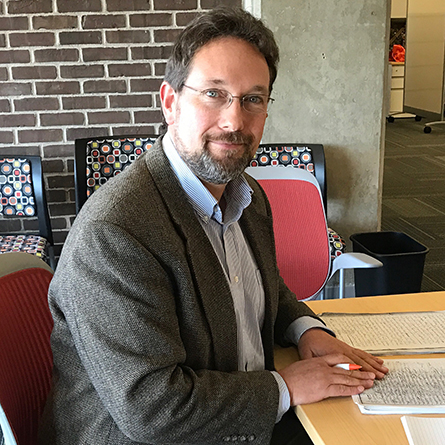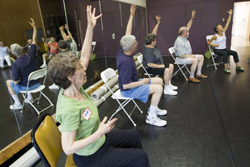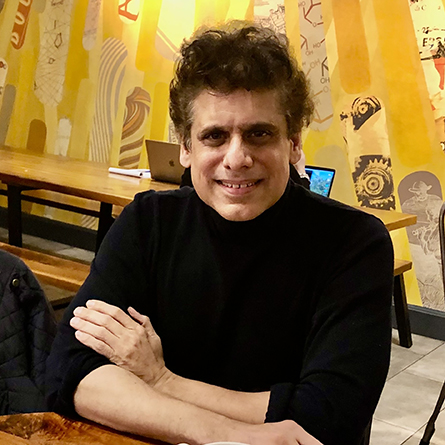
Stan Wertheimer, professor emeritus of mathematics, brings dance to people with Parkinson's Disease

Every Wednesday this summer, inside the dance studios of the College Center at Crozier Williams, a transformation is taking place. Sometimes it's a foot tapping. Other times it's two arms reaching; fingers playing an imaginary piano. But no matter what - it's dancing.
"The main thing is - how many people can you help?" says 74-year-old Stan Wertheimer, professor emeritus of mathematics and founder of the Connecticut Parkinson's Work Group, which brought the free dance class for people with Parkinson's Disease, their family and friends to Connecticut College this summer.
Wertheimer founded the work group in 1994, five years after he was diagnosed with the disease as a professor at the College. The group has since grown into "a force to be considered," a group that not only serves to advocate for people with Parkinson's Disease but also serves as a social network and information source. He is particularly proud of that fact that CPWG is entirely run by individuals with PD.
"It's rare that these organizations are run by a person with Parkinson's Disease," said Wertheimer, handing each dancer a nametag as they arrived. "Because you get tired."
Inside the dance studio, about 20 people, all seated in a circle, physically acted out their hopes and dreams, following a cue from their dance instructor, Rachel Balaban.
"I've always wanted to hold up the cup after winning Wimbledon," said a man named Larry, who held up his arm to indicate the imaginary cup in his hand. The rest of the class followed. Others said "Bob Dole," "spoiled rotten," "a bird," and choose a motion for the rest of the class to follow. They "milked the cow" to the song "9 to 5." They shook it to "Love Train." They acted as mirrors for one another as they mimed their morning routines, complete with teeth-brushing and sugar for the coffee.
"Automatic movement is difficult" for those with PD, says Balaban. It´s the "thinking about it" that makes the class so useful. She mentions psychoneuroimmunology - the interaction between psychological processes and the nervous and immune systems of the human body. The class is fun, it's communal; it's freeing, she says. "When people start to feel better, it really reaches into all their areas of their lives," Balaban says. "They're so bright and vital. Their minds are so sharp but their bodies have shut down on them."
The method - called "Dance for PD" - was originally developed by the Mark Morris Dance Group in Brooklyn, N.Y., and was presented at the World Parkinson Congress and Neuroscience 2008 in Washington, D.C., and at the International Congress for Parkinson's Disease and Related Disorders in Berlin. Since 2001, MMDG has held a weekly class in partnership with the Brooklyn Parkinson Group, for people with Parkinson's Disease and their caregivers and families.
Wertheimer compared it to an introductory math course he taught at Connecticut College, geared toward right-brained thinkers, including a number of dancers.
"It was not an easy course, and it built on the students' strengths to allow them to access mathematical thinking and take it to a deeper, more critical level. Now, Connecticut College - and its dance department and department chair David Dorfman - is helping people with PD by allowing us to use this facility to conduct classes in which people with PD can build on their own strengths (desire to move, need for exercise, love of music)," he said.
Balaban, who combined a long dance history with her desire to help others in agreeing to teach this class, said she couldn't be more thrilled to be teaching the class at Connecticut College to such an uninhibited and willing group of participants.
"To be doing this work in a bona fide dance studio is a huge deal," she said. "…I think it's fantastic. These are amazing, courageous people who are really hungering for this."
- Julie Wernau
August 18, 2009
